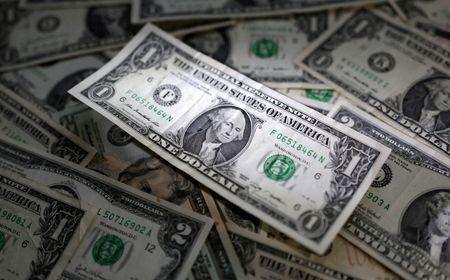 1
1 1
1
By Rae Wee
SINGAPORE (Reuters) – The dollar languished near a one-month low against a basket of currencies on Thursday, after Federal Reserve Chair Jerome Powell stuck to his usual messaging at his semi-annual testimony, offering little room for surprise.
Sterling was perched near a one-year high ahead of the Bank of England’s (BoE) interest rate decision later in the day, with Wednesday’s hot inflation report likely to keep policymakers on their toes.
In remarks to lawmakers on Capitol Hill on Wednesday, Powell said further U.S. rate increases are “a pretty good guess” of where the Fed is heading if the economy continues in its current direction. Those comments were in line with what the central bank said at its policy meeting last week.
The U.S. dollar index last stood at 102.09, not far from its recent five-week low of 102.00, after having fallen nearly 0.5% in the previous session.
Trading was thinned in Asia with Hong Kong and China closed for a holiday.
The euro rose to a more than one-month high of $1.0995, extending Wednesday’s 0.65% jump.
“Markets had priced in a lot of hawkishness from Powell prior to his testimony, so his comments didn’t really surprise too much on the hawkish end,” said Carol Kong, a currency strategist at Commonwealth Bank of Australia (CBA).
“At this stage, (markets) are not convinced that the FOMC can do two more rate hikes this year.”
Elsewhere, sterling fell 0.1% to $1.2755.
The BoE is set to raise interest rates for a 13th time in a row later on Thursday, a day after inflation data came in higher than expected, though traders are split between a 25-basis-point and 50bp hike.
British inflation failed to ease in May and held at 8.7%, defying market expectations and making it the highest of any major economy.
“The strong UK inflation data raised the probability of a larger hike than 25bp, a higher terminal rate and rates staying higher for longer,” said economists at ANZ in a note.
Against the Japanese yen, the dollar slipped 0.05% to 141.81, having touched a seven-month peak of 142.37 yen in the previous session.
The Japanese currency has come under renewed pressure as the Bank of Japan (BOJ) continues to stick to its ultra-dovish stance. BOJ board member Asahi Noguchi said on Thursday the central bank must maintain an ultra-loose monetary policy to ensure wages, seen as key to driving inflation to its 2% target, continue to increase as a trend.
WAITING FOR STIMULUS
In Asia, the Chinese offshore yuan languished near Wednesday’s seven-month trough and last bought 7.1823 per dollar, as traders remained on the lookout for greater support measures from Beijing to revive China’s faltering economic recovery.
“Until we get the confirmation on a stimulus package, (the yuan) will likely remain under downward pressure because of the soft outlook for the Chinese economy and that will in turn likely be a headwind for the Aussie as well,” said CBA’s Kong.
The Australian dollar fell 0.51% to $0.6762, while the kiwi dipped 0.2% to $0.6190.
In cryptocurrencies, Bitcoin gained more than 1% to $30,339, having risen above the $30,000 level for the first time since April on Wednesday, boosted by BlackRock’s plan to create a bitcoin exchange-traded fund (ETF) even as the sector faces U.S. regulatory scrutiny.
“The dark clouds overshadowing crypto have lifted in recent days amid a burst of institutional interest,” said Kate Laurence, co-founder and CEO of Bloccelerate VC.
“The likes of BlackRock, Charles Schwab, Fidelity and Citadel throwing their hats into the crypto ring is hugely significant because it shows that institutions are very serious about the space despite the recent regulatory crackdown.”
The Wall Street Journal reported on Tuesday that EDX Markets, a crypto exchange backed by Citadel Securities, Fidelity and Schwab, had started operations.
(Reporting by Rae Wee; Editing by Sam Holmes and Muralikumar Anantharaman)